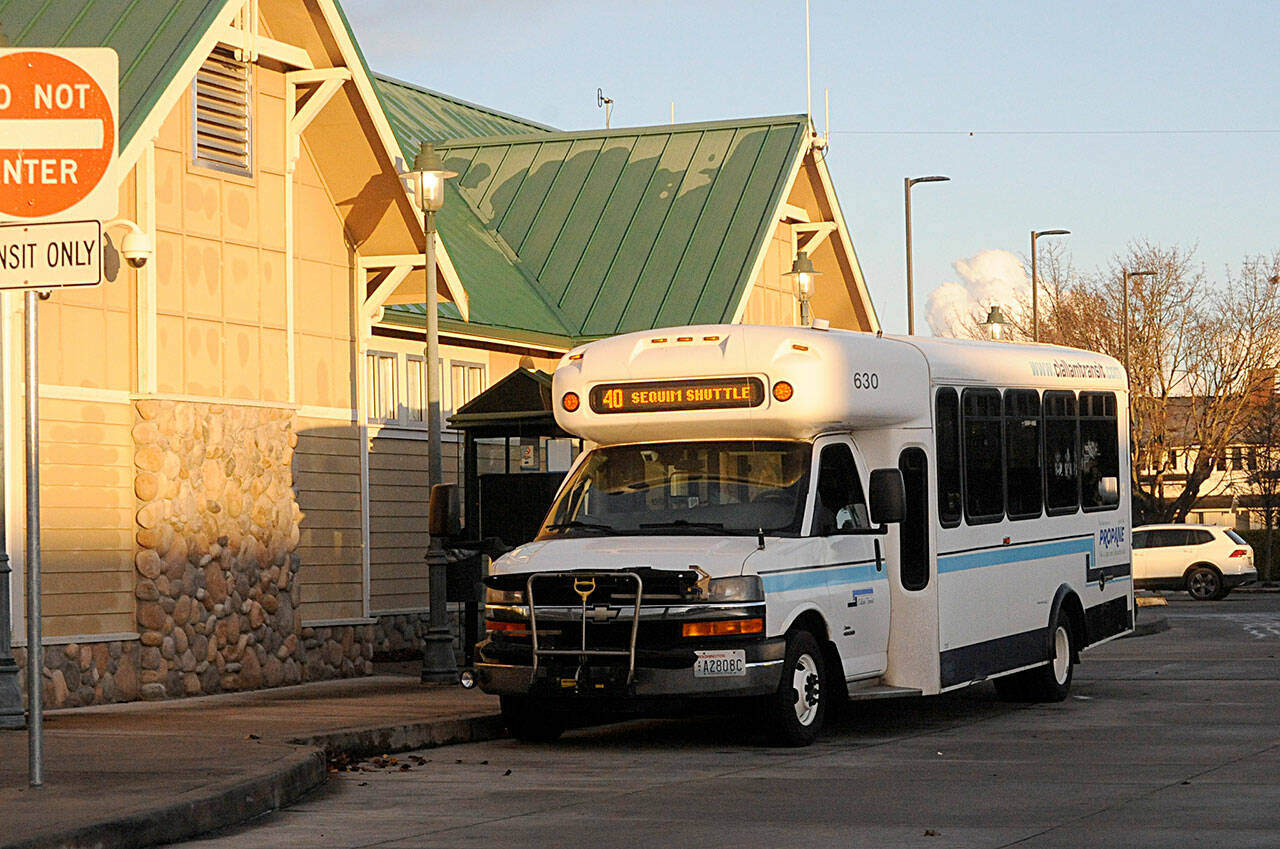SEQUIM — While COVID-19 caused a decline in Clallam Transit’s annual ridership, exclusions, defined as temporary bans from service following misbehavior, rose above pre-pandemic levels the past two years.
Clallam Transit staff reported 25 exclusions in 2019, 39 in 2020 and 34 in 2021.
Operations manager Jim Fetzer said that equates to one exclusion per 29,005 passengers in 2019, one per 10,862 in 2020, and one per 10,967 passengers through most of 2021.
“A little bit of it is that the pandemic has put people on edge, and we’re seeing more people with mental health and substance abuse issues,” he said.
Clallam Transit’s “Rules of Conduct” lists 50 prohibited behaviors. Among them are breaking any federal, state or municipal civil or criminal law; destroying Clallam Transit System property; fighting; loitering or “hanging out”; and sleeping, camping or storing personal property on benches or floors or within vehicles, facilities or properties unless otherwise authorized by law.
Depending on prior violations, riders can be prohibited by transit staff from using the bus system for 30 to 90 days, while law enforcement through the court system can exclude a passenger from specific transit properties depending on the level of crime.
Clallam Transit’s General Manager Kevin Gallacci said transit staff can act on top of a court ruling and enforce system-wide exclusions, too.
Transit operators hold the right to refuse service, and passengers have the right to an appeal process, according to transit documents. However, Gallacci said, appeals are infrequently requested.
He said most of the exclusions occur before passengers even board.
“We have a good system in place,” Gallacci said. “Operators are more and more actively aware of unwanted behavior. It doesn’t always lead to an exclusion, but it can lead to a supervisor speaking to this person.”
One example is speaking to someone loitering at a transit stop and telling them it’s not allowed, Gallacci said.
Staff have received more de-escalation training too and are “working hard to be proactive and responsive,” Fetzer said.
“We do our best to make sure everyone feels safe,” he said.
Fetzer estimates about 75 percent of exclusions occur off a bus and are mostly nuisances, such as being intoxicated or individuals sleeping in bus shelters.
“A lot of times a bus will pull up to a stop and the operator will see it and recognize (for example that) a person is badly intoxicated,” he said.
Gallacci said they do their best to enforce their rules.
“We don’t like doing exclusions, but if someone’s behavior warrants it, we don’t want them on our buses for a period of time … People depend on us going on time and for a hassle-free trip,” he said.
Gallacci said a violent episode last September was an extreme example of an incident on a bus. Two Port Angeles brothers allegedly beat a 68-year-old Neah Bay man on a bus ride west of Port Angeles after he asked them to “hold the noise down.”
As they await trial, bail was set at $1 million for Steven Rene Davis, 39, and $750,000 for Channing Warren Davis, 36, both of whom remain in Clallam County jail, according to the jail roster.
Bus safety
Despite that incident, Gallacci said bus rides remain safe.
“It’s definitely very safe to ride,” he said.
In an analysis of ridership, Gallacci said staff found more than 60 percent of riders own vehicles of their own but opt for a bus ride.
“People choose to use us for where they’re going and depend on us,” he said.
With provisions in place for the pandemic to wear masks similar to air travel, Fetzer said most people comply, that they have few issues with it and that transit has not excluded anyone for it.
Vandalism and theft is not common either, transit staff said.
Someone shot the glass out of 12 shelters between Sequim and Port Angeles in 2021, costing Clallam Transit several thousand dollars to repair, Gallacci said. There was also one vehicle stolen from The Gateway transit center.
Gallacci said transit staff have become more proactive about de-escalation efforts prior to new legislation, such as House Bill 1054, that some state and local law enforcement leaders say restricts law enforcement in certain situations.
He said law enforcement agencies advised him that his transit operators should call 9-1-1 only in the case of a serious crime, especially one involving violence.
The Sequim Police Department reports it answered calls at the Sequim Transit Center, 190 W. Cedar St., 54 times in 2019 with three reports, including one theft; 32 times in 2020 with two reports, including a warrant arrest; and 27 times through most of 2021 with one theft.
The Port Angeles Police Department reports that officers responded to the Gateway Transit Center, 123 E. Front St., 80 times in 2019 with nine reports; 81 times in 2020 with 13 reports; and 55 times through most of 2021 with 10 reports. Staff said their reports ranged from trespassing to source contacts and follow-ups to a misdemeanor assault.
Future
Despite the pandemic, Gallacci said ridership is slowly coming back.
He said they’re looking at service improvements across the system with opportunities coming up for public comment.
“We may be making some changes, and hopefully there’ll be extensions,” Gallacci said.
“We’re trying to extend service later in the evening, too. That’s going to be a long process.”
Clallam Transit’s board approved an additional $600,000 for extra services this year, he said. The biggest challenge will be adding bus operators to accommodate the additions, Gallacci said.
Currently, Clallam Transit offers 14 routes across Clallam County. Gallacci said transit has had growth in newer systems, including the Token Transit app that allows passengers to pay with their smartphones and GPSUnite to track buses in real time.
For more about Clallam Transit, visit www.clallamtransit.com.
________
Matthew Nash is a reporter with the Olympic Peninsula News Group, which is composed of Sound Publishing newspapers Peninsula Daily News, Sequim Gazette and Forks Forum. Reach him at mnash@sequimgazette.com.

